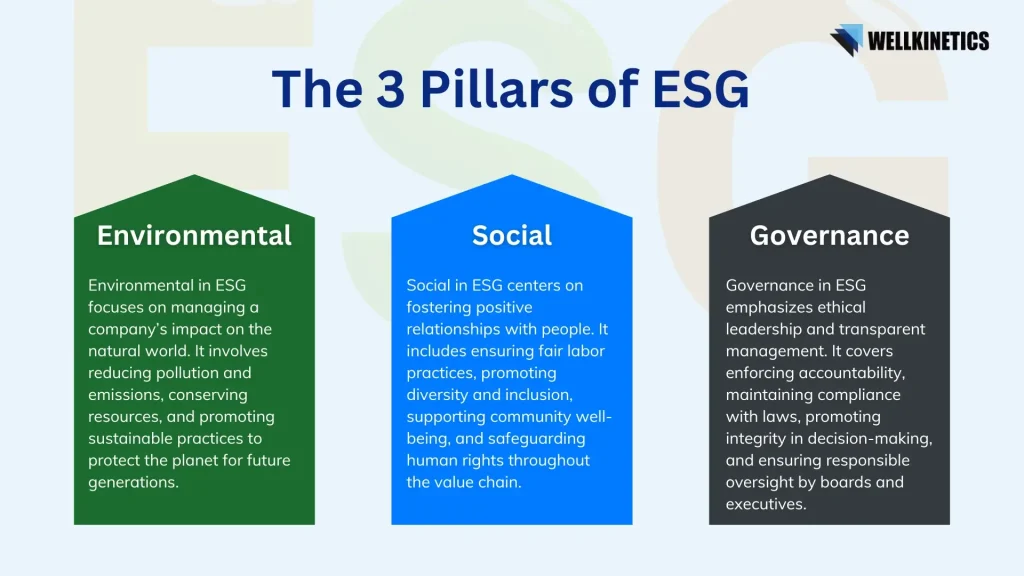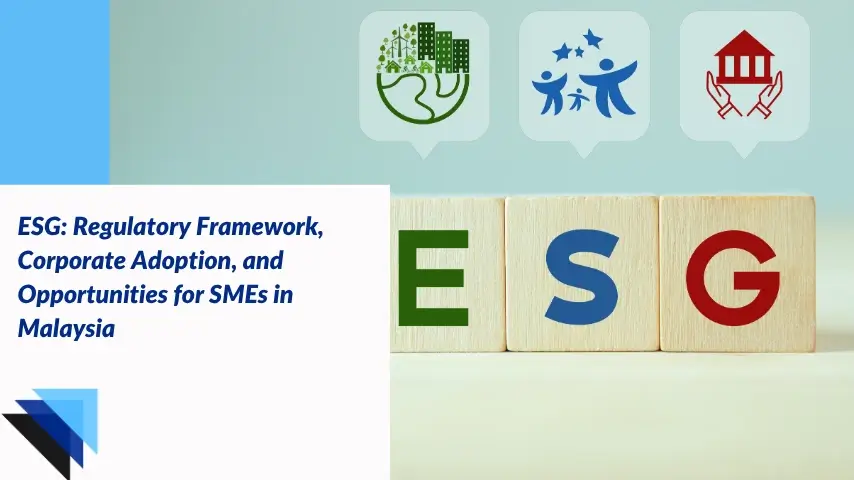ESG in Malaysia refers to the principles of Environmental, Social, and Governance, which guide businesses and organizations in operating responsibly and sustainably. It provides a structure for assessing how organizations address environmental challenges, support societal well-being, and maintain transparent and accountable governance.

Environmental, Social, and Governance (ESG) principles have become an integral part of how businesses operate globally, especially in recent years. Driven by mounting environmental crises, heightened social awareness, and demands for accountability, ESG is now central to investors’ decisions, governments’ regulatory agendas, and the ethical compass of organizations. The scope of ESG is broad: it covers carbon emissions, resource management, labor practices, diversity and inclusion, anti-corruption policies, board effectiveness, and more.
Malaysia, as one of Southeast Asia’s leading economies, has embraced ESG as a cornerstone for sustainable development and national competitiveness. The government, regulatory agencies, institutional investors, corporations, and small businesses alike increasingly recognize ESG as vital for not just compliance, but also for innovation, risk management, business resilience, and international market access. Malaysia’s unique context—a diverse economic base, vibrant SME sector, and active participation in global trade—has both accelerated ESG adoption and highlighted localized challenges in moving towards holistic sustainability.
This article explores the ESG journey in Malaysia through three thorough lenses: the evolving regulatory framework, how corporations (both large and small) are implementing ESG strategies, and the specific opportunities as well as hurdles faced by Small and Medium Enterprises (SMEs).
Ready to Build a Solid ESG Foundation for Your Business?
Get expert guidance on navigating Malaysia’s ESG regulatory landscape with confidence.
What is the regulatory framework for ESG in Malaysia?
Malaysia’s ESG regulatory framework is guided by active oversight from authorities like Bursa Malaysia and the Securities Commission, who have established clear ESG disclosure requirements, reporting standards, and oversight mechanisms for businesses, especially publicly listed companies. These regulations aim to encourage transparency, responsible business practices, and alignment with global sustainability benchmarks.
How is ESG governance structured in Malaysia?
Malaysia’s ESG landscape is defined by the coordinated efforts of key regulatory bodies, active public policymaking, and growing market demands for sustainability. As the need for robust and transparent ESG disclosures grows, authorities have responded by laying out detailed requirements, oversight mechanisms, and incentives to help businesses of all sizes stay on course.
How is Bursa Malaysia guiding ESG compliance for listed companies?
Bursa Malaysia, the country’s stock exchange, has long recognized the importance of sustainability disclosure. Since 2015, Bursa rules have required all listed companies to publish sustainability statements in their annual reports. These statements must address material ESG risks and opportunities, stakeholder engagement, and include at least one performance indicator each for environmental, social, and governance pillars.
Bursa Malaysia prioritizes staying aligned with international sustainability benchmarks. By continuously updating its guidelines, it incorporates elements from globally respected frameworks like the GRI and TCFD, fostering transparency and accountability in corporate practices. In 2023, Bursa raised the bar by mandating climate-related disclosures in line with international best practices. Notably, the exchange has also advocated the appointment of board-level sustainability committees, ensuring that ESG issues are managed strategically rather than reactively.
How is the Securities Commission Malaysia advancing ESG through corporate governance?
The Securities Commission Malaysia (SC) plays a significant role in shaping corporate practices, primarily through the implementation of the Malaysian Code on Corporate Governance (MCCG). Updated in 2021, the code now places explicit emphasis on board diversity, anti-corruption, and long-term value creation as inseparable from ESG success. Listed entities are expected to disclose oversight of sustainability strategies, risk management processes, and measurable ESG targets.
Importantly, SC drives Malaysia’s leadership in Islamic finance, especially in the issuance of green and sustainable sukuk. According to the Sukuk Perceptions and Forecast Study 2022 by GIFIIP, Malaysia was the top issuer of green sukuk globally in 2022. This innovative approach helps integrate Islamic financial principles with sustainability, opening up new funding channels.
On 24 September 2024, the National Sustainability Reporting Framework (NSRF) was officially launched by the Ministry of Finance in collaboration with the Securities Commission Malaysia (SC), as the baseline for sustainability reporting in Malaysia. It embeds ISSB IFRS S1 (General Sustainability Disclosures) and IFRS S2 (Climate-related Disclosures) into national reporting standards.
The NSRF introduces a phased implementation timeline across three groups of entities:
- Group 1 (Main Market listed issuers with ≥ RM 2 billion market cap): adopt from 2025, first reports due 2026
- Group 2 (other Main Market listed issuers): adopt from 2026
- Group 3 (ACE Market listed issuers & non-listed companies with ≥ RM 2 billion revenue): adopt from 2027
A climate-first disclosure approach is allowed: for the first two reporting years (or three for Group 3), companies may focus on IFRS S2 climate disclosures and defer full sustainability topics and Scope 3 emissions reporting, depending on readiness.
External assurance for Scope 1 and Scope 2 greenhouse gas disclosures is targeted to become mandatory starting in 2027, following stakeholder consultations.
ACSR’s PACE initiative (Policy, Assumptions, Calculators & Education) supports companies, especially SMEs, with capacity building, tools, and policy guidance to facilitate compliance.
RELATED: Sustainability Frameworks: A Guide to Global Standards and Their Application in Malaysia
How is Bank Negara Malaysia driving ESG in the financial sector?
Bank Negara Malaysia (BNM) places strong focus on the involvement of financial institutions in driving environmental, social, and governance (ESG) efforts. Through the Climate Change and Principle-based Taxonomy (CCPT), BNM compels financial institutions to assess, classify, and disclose the environmental impact of their lending and investment decisions. The taxonomy was developed following extensive consultation with the financial sector, emphasizing a unified approach to managing climate risk, transition financing, and green project investment.
BNM’s Financial Sector Blueprint 2022-2026 further aims to foster a climate-resilient financial ecosystem. The blueprint promotes innovative financial solutions, like green bonds and sustainability-linked loans, to attract private funding for environmentally friendly and socially inclusive economic initiatives.
What government initiatives and incentives support ESG adoption in Malaysia?
Malaysia’s government has also invested heavily in policy frameworks aimed at promoting sustainability across sectors:
- Twelfth Malaysia Plan (12MP): The nation’s development blueprint for 2021–2025 makes sustainability integral, targeting reductions in greenhouse gas emissions and increasing renewable energy capacity. The 12MP also encourages regional development through low-carbon cities, improved waste management, and social equity programs.
- Green Technology Master Plan (GTMP): Spanning 2017–2030, the GTMP outlines sectoral strategies to spur green investment, energy efficiency, clean manufacturing, and job creation. Progress is tracked through KPIs, including targets for green jobs and renewable energy adoption.
- National Low Carbon Cities Framework (NLCF): Municipalities are empowered to set emissions baselines, develop action plans, and monitor progress—aligning urban growth with climate targets.
- MyHijau Mark: An eco-label for environmentally friendly products and services. According to statistics from MyHIJAU (Malaysia’s official green certification platform), as of 2024, 18,163 products and services and 925 companies hold the MyHijau Mark, with government procurement policies favoring certified suppliers.
- Tax Incentives and Grants: Green income tax exemptions, R&D funding for renewable energy, and other fiscal tools target both established firms and SMEs willing to invest in ESG-aligned activities.
What statistics highlight the momentum of ESG adoption in Malaysia?
The growing adoption of ESG in Malaysia is underscored by compelling data:
- Green financing in Malaysia has seen significant growth in recent years, rising sharply from 2020 into 2022. According to the IMF’s 2023 Article IV Consultation report, sustainable finance volumes increased from US $0.8 billion in 2017 to US $4 billion in 2022.
- As of 30 April 2025, the Securities Commission Malaysia (SC) listed approximately 70 Sustainable and Responsible Investment (SRI) funds in its register, reinforcing trends in ESG capital market growth (Securities Commission Malaysia, 2025).
Despite this progress, challenges persist: inconsistent reporting standards, information gaps in supply chains, and limited uptake among SMEs point to ongoing needs for technical support and regulatory clarity.
Need Help Navigating ESG Reporting Requirements?
Ensure your sustainability disclosures meet Bursa Malaysia’s evolving standards.
How are Malaysian corporations adopting ESG strategies?
Many Malaysian corporations are incorporating ESG strategies by going beyond basic compliance and integrating sustainability into their core business practices. Driven by regulatory requirements, investor expectations, and market competitiveness, companies are focusing on environmental initiatives, social responsibility, and transparent governance to create long-term value and strengthen resilience.
How are large corporations in Malaysia shifting ESG from compliance to value creation?
Malaysia’s leading corporations have expanded their interpretation of ESG from mere regulatory compliance to strategic drivers of business resilience and growth. The changing landscape is most noticeable among publicly listed companies, multinationals, and sectors with significant environmental and social footprints.
What are some pioneering ESG case studies in Malaysia’s corporate sector?
Several leading Malaysian companies have set benchmarks in ESG by integrating sustainability into their core strategies. These case studies highlight how different sectors are taking bold steps toward responsible and impactful business practices:
1. Petronas:
The national oil and gas company exemplifies leadership with its “Net Zero Carbon Emissions by 2050” pledge. Initiatives include developing large-scale solar projects, piloting carbon capture and storage, and pushing innovations such as green hydrogen. Petronas also maintains rigorous health, safety, and community investment programs.
2. CIMB Group:
CIMB, one of ASEAN’s biggest banking groups, is recognized for its early adoption of exclusion policies on coal, launching the region’s first sustainability-linked loans, and publishing granular ESG disclosures. CIMB engages suppliers, customers, and partners in climate-conscious financing and green bond programs.
3. Sunway Group:
Sunway tracks ESG performance across its conglomerate—from green building certifications for its property arm to strict supply chain management standards in healthcare and retail.
4. Sime Darby Plantation:
Facing scrutiny over labor conditions and deforestation, Sime Darby Plantation has invested in traceable supply chain technology, zero-burning policies, and extensive community engagement, lifting its ESG credentials and export market access.
What are the key ESG trends across different sectors in Malaysia?
Different sectors have unique ESG priorities and approaches:
- Energy and Utilities: Decarbonization, renewables integration, “just transition” for affected communities.
- Banking and Financial Services: ESG risk assessment for lending, portfolio climate scenario analysis, development of green financial products.
- Manufacturing: Resource efficiency, circular economy practices, labor rights, waste reduction.
- Plantations and Agriculture: Biodiversity conservation, sustainable sourcing (e.g., RSPO, MSPO certification), smallholder support.
- Real Estate and Construction: Green building standards, urban livability, energy-efficient infrastructure.
How are stakeholders engaging with ESG and what is the market response in Malaysia?
Investors and consumers alike evaluate companies based on ESG credentials. A BlackRock global client survey (2020) found that approximately 75% of institutional investors worldwide use or would consider ESG factors in their investment processes.
ESG-linked investments, such as green sukuk and sustainability-themed unit trusts, are growing rapidly. The FTSE4Good Bursa Malaysia Index now tracks more than 70 local companies meeting stringent ESG criteria, influencing capital allocation and boardroom agendas.
What internal challenges and barriers do Malaysian companies face in implementing ESG?
While ESG adoption is growing, many Malaysian companies still struggle with internal barriers such as inconsistent data, high costs, limited cultural alignment, and risks of greenwashing. Key challenges include:
- Standardization and Data Quality:
Few companies collect consistent data across their value chains. Reporting frameworks (GRI, SASB, TCFD) vary, and aligning disclosures remains a resource-intensive task. Investment in ESG reporting platforms and third-party data validation is becoming essential.
- Costs and ROI Measurement:
Upfront investments in cleaner technology, green infrastructure, and workforce training are sometimes hard to justify, particularly without immediate financial returns.
- Cultural Change:
Integrating ESG into business decision-making requires buy-in at all levels, not just compliance from a sustainability department. Champions within C-suites and on boards are vital for driving ESG from strategy to action.
- ESG Washing:
There is increased scrutiny for “greenwashing,” with Malaysian regulators and civil society monitoring the veracity of sustainability claims, especially for companies accessing public funds or green incentives.
Struggling with ESG Implementation Challenges?
We’ll help you overcome reporting gaps, cost barriers, and stakeholder buy-in issues.
How are Malaysian corporations building ESG capacity and knowledge?
To close the knowledge and practice gaps, corporations are investing in internal capacity-building, partnering with local universities, and benefiting from professional networks. The rise in ESG courses, certifications, and masterclasses further aids in developing a new generation of sustainability professionals and leaders.
What opportunities exist for SMEs to adopt ESG practices in Malaysia?
Small and Medium Enterprises (SMEs) are vital to Malaysia’s economy, contributing nearly 40% of GDP, employing around 7 million people, and accounting for 98.5% of all business establishments (Department of Statistics Malaysia, 2024; SME Corp Malaysia, 2024). However, ESG adoption in this sector is markedly uneven. Challenges include limited resources, lower awareness, and technological barriers but there are also unique opportunities. Fortunately, a range of supports and frameworks including the Simplified ESG Disclosure Guide (SEDG) creates tangible opportunities.
What are the main challenges SMEs face in adopting ESG in Malaysia?
Malaysian SMEs face several barriers that make ESG adoption difficult, from limited awareness to financial and operational constraints. Key challenges include:
1. Limited Awareness and Understanding
Many SME owners are unclear about how ESG principles translate into practical actions or business benefits. Surveys by SME Corp Malaysia show that while 60% of SMEs are “familiar” with sustainability, less than 25% have an ESG policy or publish a sustainability report.
2. Resource Constraints
SMEs typically lack dedicated teams or budgets for sustainability initiatives. Even simple improvements (energy-efficient equipment, waste reduction schemes) may seem out of reach compared to operational priorities.
3. Complexity in Certification
Meeting standards such as ISO 14001 or MSPO (Malaysian Sustainable Palm Oil) often requires technical know-how, documentation, and investment. For many SMEs, the process is confusing or financially prohibitive.
4. Supply Chain Pressures
As large corporations demand ESG compliance from their suppliers, SMEs face pressure to meet new criteria on environmental performance, labor standards, and data transparency. Non-compliance can threaten longstanding business relationships.
Are You an SME Looking to Start ESG the Right Way?
Get access to affordable ESG tools and tailored guidance for small businesses.
How can Malaysian SMEs start integrating ESG despite challenges?
Despite the hurdles, actionable steps can help Malaysian SMEs benefit from ESG integration:
1. Leverage Government Schemes and Financing
- Green Technology Financing Scheme (GTFS): Offers grants and soft loans for energy efficiency, waste management, and green technology upgrades.
- SME Digitalisation Grant: Helps SMEs invest in digital tools, such as ESG data collection and reporting platforms.
- Tax Exemptions and Credits: Incentivize certified green practices and investments in renewable resources.
2. Adopt Incremental Changes
- Start with low-cost, high-impact initiatives (reducing water and energy use, recycling programs).
- Introduce policies for fair employment, safety, and community engagement—foundational social and governance steps.
3. Collaborate for Shared Value
- Partner with industry peers, trade associations, or multinationals for joint training, shared infrastructure (like waste collection or renewable energy procurement), and knowledge exchange.
- Participate in government- or NGO-led pilot projects and accelerators (e.g., UN Global Compact’s Small Business Network Accelerator).
4. Build Capacity and Seek Recognition
- Invest in basic sustainability training for staff.
- Work towards certifications (even basic ones such as MyHijau for products/services), which enhance credibility and open new market channels.
5. Utilize SEDG as a Launchpad
- Streamlined and SME-specific: SEDG, launched in October 2023 by Capital Markets Malaysia (a SC affiliate), is a practical ESG disclosure guide tailored for SMEs, especially those within supply chains. Malaysia is the first country globally to roll out such a standardized framework for SMEs
- 35 priority disclosures organized into Basic, Intermediate, and Advanced tiers allow SMEs to progress at their own pace and maturity
- Sector Guides launched in mid‑2024 provide enhanced environmental and social disclosure requirements for five high-impact industries: Energy; Transport & Logistics; Construction & Real Estate; Manufacturing; and Agriculture.
What are the benefits of embracing ESG for SMEs?
Embracing ESG offers SMEs several practical advantages that directly impact business performance and long-term growth:
- Market Access:
Complying with ESG standards helps SMEs retain and attract clients, especially multinationals and export markets where regulatory scrutiny is rising.
- Cost Savings:
Simple changes such as energy-saving devices, reduced raw material usage, optimized logistics yield long-term savings.
- Talent Attraction and Retention:
A positive, purpose-driven brand attracts skilled workers, especially among younger job seekers.
- Resilience and Trust:
Companies with strong ESG practices recover better from crises (such as the pandemic) due to resilient supply chains, stronger community ties, and loyal customers.
- Innovation Catalyst:
Sustainability challenges force companies to innovate, leading to fresh business models, partnerships, and products.
How does digitalisation support ESG adoption for SMEs?
The shift toward digital reporting, cloud-based data collection, and online ESG resources has drastically lowered entry barriers for SMEs. Startups like Funding Societies and niche consultancies offer affordable ESG tracking and supply chain solutions, while public bodies develop easy-to-use toolkits and data templates. As ESG mandates from larger downstream customers grow, digital tools will be vital for SMEs to meet expectations quickly and affordably.
How do public-private partnerships and NGOs support SMEs in ESG adoption?
There’s growing support for SMEs in the form of training, funding, and networks:
- Malaysia Green Technology and Climate Change Corporation (MGTC): Offers guidance, certifications, and access to green procurement opportunities.
- Industry Associations: Regularly organize seminars and sponsor sustainability pilot projects.
- Chambers of Commerce and NGOs: Provide mentorship, workshops, and links to international partners.
What is an ESG consultant and what role do they play?
An ESG consultant is a professional who guides organizations in integrating sustainability principles into their business operations. In Malaysia’s evolving ESG landscape, ESG consultants play a crucial role for companies of all sizes, especially as regulations and stakeholder expectations become more demanding.
Key roles and responsibilities of ESG consultants include:
- Regulatory Compliance: ESG consultants help companies understand and meet national requirements such as those set by Bursa Malaysia, the Securities Commission, and Bank Negara. This ensures businesses avoid penalties and maintain strong reputations.
- Strategy Development: They work with organizations to create ESG roadmaps, set measurable sustainability goals, and align business practices with international standards like GRI or IFRS.
- Sustainability Reporting: ESG consultants assist in preparing credible, transparent, and impactful sustainability reports, enabling companies to communicate their ESG performance to investors, clients, and the public.
- Materiality Assessment: By engaging stakeholders and analyzing business risks and opportunities, ESG consultants ensure organizations prioritize the most relevant and impactful ESG issues.
- Capacity Building: They provide training and practical tools that empower internal teams to implement and sustain ESG initiatives over the long term.
Through these services, ESG consultants act as trusted partners, supporting businesses to achieve operational excellence, attract investment, strengthen stakeholder trust, and future-proof their operations in a dynamic market.
Need a Trusted ESG Consultant for Your Business?
Our consultants are ready to help you build an actionable, measurable ESG roadmap.
Why Choose Wellkinetics
Selecting the right ESG partner can make all the difference in your sustainability journey. Here’s why Wellkinetics stands out as a leading sustainability consultant for businesses in Malaysia:
- Proven Experience: Wellkinetics brings years of specialized experience in ESG consulting, sustainability reporting, and regulatory compliance, guiding organizations of all sizes to achieve their sustainability goals.
- Reliability You Can Trust: Clients count on Wellkinetics for dependable, high-quality solutions that meet local and international ESG standards, ensuring you stay ahead in an evolving regulatory environment.
- Commitment to Quality Assurance: Every project benefits from Wellkinetics’ rigorous quality standards and attention to detail, resulting in impactful, transparent, and actionable ESG strategies and reports.
- Dedicated Professional Teams: The Wellkinetics team is made up of passionate, cross-disciplinary professionals who work closely with your organization to provide tailored, practical advice and hands-on support.
- Client-Centric Approach: Wellkinetics prioritizes understanding your unique business needs, providing bespoke ESG solutions that drive real performance improvements and long-term value.
Partnering with Wellkinetics means gaining a strategic ally who is dedicated to strengthening your ESG practices, enhancing your reputation, and ensuring sustainable growth for your organization.




